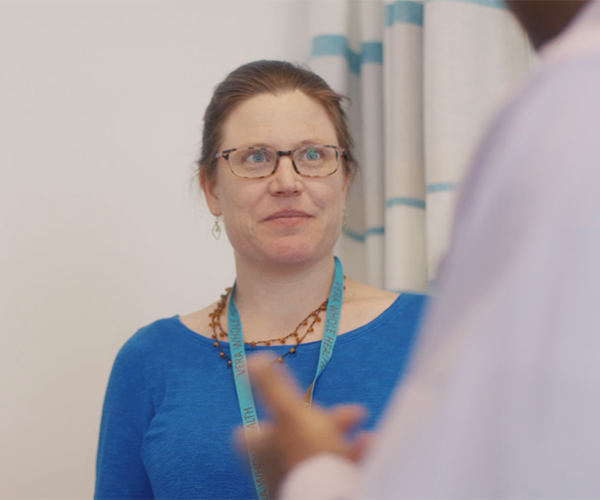It’s no secret that providers enter the healthcare field to help people. The traditional way of offering care is modeled around telling patients what to do and trying to see as many people as possible. But the traditional way is broken.
Research shows a lot of chronic illnesses actually occur because of lifestyle changes — and behavioral change takes time.
That’s why integrating health coaches are foundational to our model. Our coaches take the time to develop relationships with patients, practice empathetic listening, and help encourage positive (and lasting) health changes. Vera is actually founded on health coaching; it’s a core service. And we don’t mean coaches placed at disconnected locations — we embed health coaches within the care teams at our primary care centers.

Health coaches help patients believe they can change. By focusing on preventive care, we’re helping people change their lifestyles and their behaviors so that they can live healthier, longer lives and really take ownership of their health and wellness.
Prioritizing credibility and professionalism
Currently, anybody can call themself a health coach. We've found that a lot of coaches and candidates have coaching experience, but they don’t necessarily have “health coaching” experience. But we hold ours to the highest standard — from clinical training and certifications to procedures and charting, we created a program in which our health coaches receive in-depth training that specifically suits primary care.
Primary care is a fast-paced environment where teams work collaboratively. With the stakes so high, we took the initiative to partner with the National Board for Health and Wellness Coaching and became an approved training program. That means each of our coaches receive unified training — and we ask all our health coaches to get certified within 18 months of hire.

Uniform health coach training has proven to be a game changer — and it's helping health coaching become more recognized in the healthcare profession.
In addition, effective April 2021, a taxonomy code was approved so that coaches can apply for an NPI (National Provider Identifier), which allows claims to be submitted. This change moves the industry one step closer to having reimbursable CPT (Current Procedural Terminology) codes for coaching.
Currently, coaches can use category III CPT codes, which are temporary codes used for emerging services to help with research. The goal is to get to category 1, which means the FDA approves the service, it is performed by healthcare professionals nationwide, and is proven and, therefore, insurances will likely reimburse for the services.
Integrating health coaches with care teams
All our health coaches are located within Vera care centers, so they're easy for our providers — and patients — to access. If we're thinking about preventive care, we encourage all of our patients to do a wellness exam every year, and our wellness exam includes meeting with a health coach. This also allows a provider to identify any specific lifestyle changes they would encourage the patient to work on with a coach.
If patients are coming in for an office visit at any point, a provider can recommend coaching. And if the coach isn't seeing a patient, they can literally say, "Hey, Sally, we have a patient in here. I really think that they could benefit from coaching. Do you have a few minutes?"
It’s really that simple and that fluid.
The provider does a warm handoff. That way the patient, the provider, and coach are a team operating on the same page. It shows that the provider supports the coach, and it lets the patient know their provider hears them. If a provider wants a patient to work on their blood pressure, our coaches can actually take their blood pressure so they don't have to make a separate appointment.

In every instance, the coach works with the provider to make sure everything is aligned.
When I was coaching in the care center, I also got to coach my team. If a patient was resistant to coaching because they saw it as fluffy or therapeutic stuff, the provider and I would consult together. I would talk with the provider about ways they could approach it, and help them unpack it for the patient. So even if coaches aren't one-on-one caring for a patient, they're caring for the whole population because we work as a team to utilize each other’s skills.
It creates opportunities to stop, be curious, and encourage patients to go ahead and schedule an appointment with the provider.
And it helps us to encourage a whole health perspective.
When we focus on whole health, the team can really offer the right level of care to those who need to see a provider as well as to those who might be at risk or almost at risk. That's a big population.
The value of embedded health coaching
Can you imagine having an integrated health coach on your care team?
It’s unfair to assume that a primary care physician can do everything — that leads to a lot of burnout. They have to prescribe, assign patient plans, help with all sorts of chief complaints and then also, on top of that, assist with behavior change.
That's just not realistic.
And it’s also not necessarily what primary care physicians are trained for.
The bottom line is this: It's asking a lot of our providers to facilitate behavior change, and it can cause a lot of burnout. Integrating health coaches changes that dynamic.
Being able to work closely with somebody you can trust is a huge relief for providers. Coaches can share the lift of back-to-back appointments in primary care settings and can see patients more frequently than providers can. Our integrated health coaches and primary care team end up sharing a patient's journey with the physician.

When patients see health coaches more and providers less, it opens up access to patients who really need to see a provider, helps reduce provider burnout, and creates that sense of a truly collaborative partner — where the patient feels like they're part of a team.
Health coaches also help bring out totally different perspectives. They bring mindfulness to the entire care team as well as their coaching tools to offer support. That's often missing elsewhere. But in our model, health coaches encourage everyone to see things differently and that helps our providers and patients recognize that the work we're doing is truly having an impact.
Looking forward in challenging times
Healthcare providers out there are struggling, and we still have a lot of work to do.
Thankfully we have a robust team at the core of our model so that we can practice at our highest level of care, leaving no one professional to do it all.
We support each other. And that part — team collaboration — is super key to Vera.
Given the historic times we’re all living through, it’s more important than ever to be able to lean on your teammates. And that alignment drives better health outcomes.
Caring for the whole person takes time. Learn how you can move from providing sick care to healthcare by downloading our free resource The Secret to Delivering Primary Care.
Sign up
Join our email list to receive the latest open positions, Vera Careers news, and more.





